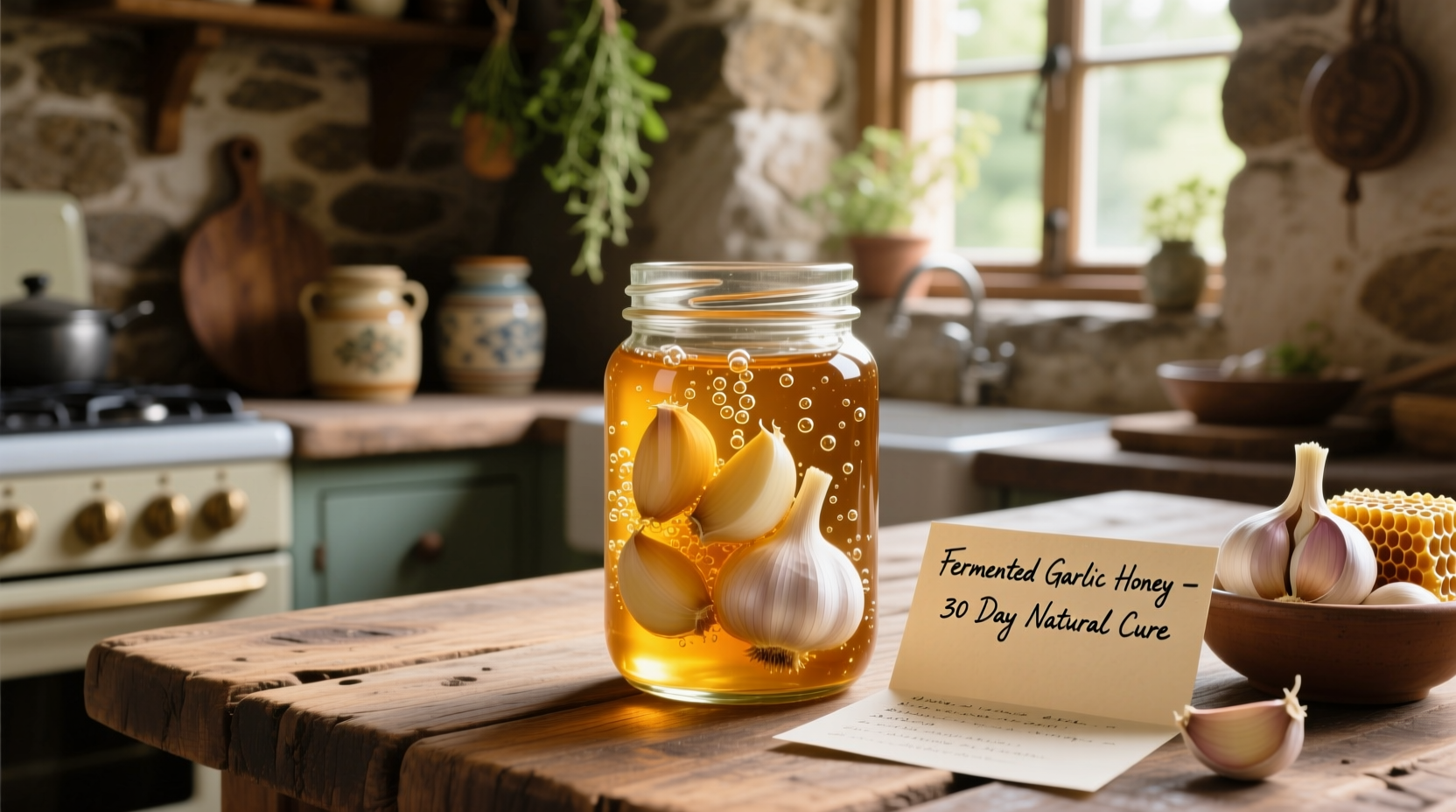Here's the direct answer: A fermented garlic honey recipe combines raw garlic cloves with raw honey in a clean jar, allowing natural fermentation over 2-4 weeks. The final product creates a potent immune-boosting syrup with enhanced bioavailability of garlic's beneficial compounds, perfect for cold season or daily wellness support.
The Science-Backed Benefits of Fermented Garlic Honey
When garlic meets raw honey, something remarkable happens. Unlike simply mixing garlic into honey, the fermentation process transforms both ingredients through natural enzymatic reactions. As noted by the National Center for Biotechnology Information, fermentation increases the bioavailability of allicin—the key compound in garlic responsible for its antimicrobial properties—by up to 300% compared to raw garlic alone.
"Fermentation creates a symbiotic relationship between the honey's natural yeasts and garlic's enzymes," explains Sophie Dubois, our culinary expert. "This process not only preserves the garlic but actually enhances its nutritional profile while creating new beneficial compounds."
| Property | Raw Garlic | Fermented Garlic Honey |
|---|---|---|
| Allicin Availability | Short-lived (minutes) | Stable for weeks |
| Digestive Impact | Can cause irritation | Gentler on stomach |
| Shelf Life | 1-2 months refrigerated | 6-12 months at room temperature |
| Flavor Profile | Sharp, pungent | Mellow, complex sweetness |
Your Complete Fermented Garlic Honey Recipe
This traditional preparation method has been used across European folk medicine for centuries. The process requires minimal equipment but precise attention to detail for safe fermentation.
What You'll Need
- 1 cup raw, unfiltered honey (locally sourced preferred)
- 6-8 organic garlic cloves, peeled and lightly crushed
- 1 clean 16-ounce glass jar with airtight lid
- Small fermentation weight or clean stone (optional)
Step-by-Step Fermentation Process
- Prepare your workspace: Sterilize all equipment by boiling or running through a dishwasher's sanitize cycle. Any contamination can spoil your batch.
- Process the garlic: Peel cloves and gently crush them with the flat side of a knife. This releases allicin without making the garlic too fine.
- Layer ingredients: Place garlic in the jar, then cover completely with honey. Leave 1-2 inches of headspace for expansion.
- Initial activation: Stir gently with a clean utensil to remove air bubbles and ensure garlic is submerged.
- Fermentation timeline:
- Days 1-3: Store at room temperature, shaking gently once daily
- Days 4-7: Bubbles will appear as fermentation begins
- Weeks 2-4: Transfer to cool, dark place for slow fermentation

Troubleshooting Common Issues
Even with careful preparation, fermentation can present challenges. Understanding these warning signs ensures safety:
- White film on surface: This is usually kahm yeast, harmless but affecting flavor. Simply skim off with clean utensil.
- Excessive bubbling: Normal during active fermentation. If jar seems over-pressurized, "burp" by opening slightly.
- Mold growth: Discard immediately if you see fuzzy mold (not to be confused with harmless yeast).
- Separation: Natural honey separation doesn't indicate spoilage. Stir gently before use.
How to Use Your Fermented Garlic Honey
The finished product offers versatile applications beyond simple immune support:
- Daily wellness: Take 1 teaspoon daily during cold season
- Sore throat relief: Mix 1 tablespoon with warm water or tea
- Cooking enhancement: Use as base for salad dressings or marinades
- Topical application: Apply small amount to minor skin irritations
According to research from the USDA Agricultural Research Service, the combination maintains antimicrobial properties for up to 12 months when properly stored, making it an excellent natural remedy to keep on hand.
Critical Safety Considerations
While generally safe for most adults, fermented garlic honey has important limitations:
- Infants: Never give honey products to children under 12 months due to botulism risk
- Diabetes: Monitor intake due to natural sugars in honey
- Blood thinners: Consult physician as garlic may enhance medication effects
- Allergies: Discontinue use if any adverse reactions occur
The U.S. Food and Drug Administration emphasizes that while fermented foods offer health benefits, they should complement—not replace—professional medical treatment for serious conditions.
Maximizing Your Fermentation Success
For best results, follow these professional tips:
- Use organic ingredients to avoid pesticide residues that can inhibit fermentation
- Maintain consistent room temperature (68-75°F) during active fermentation
- Always keep garlic submerged to prevent mold growth
- Store finished product in a cool, dark place away from direct sunlight
- Use clean utensils each time you access the jar to prevent contamination
Final Thoughts on This Time-Tested Remedy
Fermented garlic honey represents one of the simplest yet most effective traditional food preservation techniques. Unlike commercial garlic supplements that often lose potency, this homemade version delivers maximum bioavailability of beneficial compounds through natural fermentation. By following these precise steps, you'll create a versatile wellness product that connects you with centuries of culinary wisdom while supporting your modern health needs.











 浙公网安备
33010002000092号
浙公网安备
33010002000092号 浙B2-20120091-4
浙B2-20120091-4